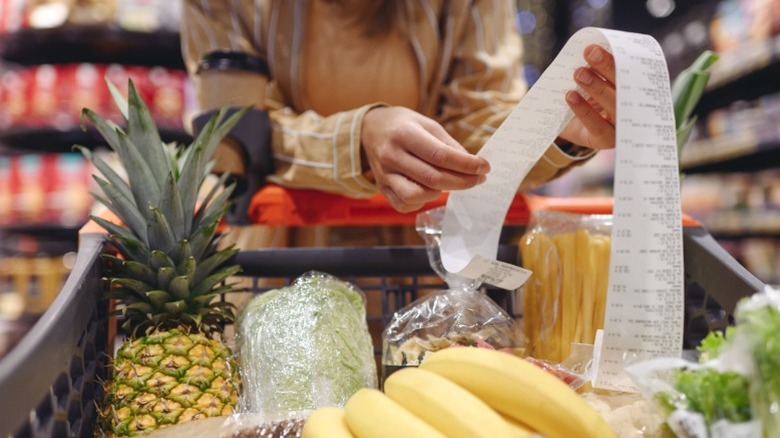How Your Local Grocery Store Decides What Goes On Sale
When you see a particularly enticing sale at your local supermarket — maybe Entenmann's donuts, the best grocery store donuts, are 2 for $5, or maybe you'll get a terrific price on a spiral ham after the holidays — you may not wonder why that specific product is being sold for a lower price. But once you start thinking about it, it's hard to stop. How do they decide what goes on sale, anyway? Do they get orders from an ominous man in a shadowy boardroom, or is there a giant wheel they spin every now and then? Well, the truth is a little more quotidian. We talked to Chip Carter, creator and host of the TV show "Where The Food Comes From," and he told us that there are two kinds of sales: sales that are deliberate, and sales that came about due to someone's mistake.
If you're shopping at a supermarket chain, Carter said, chances are the sale had been planned for some time, often based around an item's seasonality. "Grocers feature Vidalia onions — usually on sale — each April when the season officially starts," he told us. "There's demand — Vidalias run out by September — and there's volume, since the harvest has just begun and farmers have abundant crops." That means it makes economic sense to have a sale, perhaps so people can go home and make one of James Beard's beloved onion sandwiches. Alternatively, a sale might come as a result of human error, where "somebody ordered waaaaaayyyyyyy too much of something and they've gotta get rid of it."
When to take advantage of sales — and when to skip
Now that you know why something might go on sale, you can figure out when to take advantage of a lower price — and when the grocery store might be pulling a fast one on you. According to Chip Carter, it's a good idea to "wait for sales on non-perishable items," as you can go pretty far just eating whatever is in season and available. "We feast on seasonal items when they're around," he said, and suggests buying meat in bulk at your local big box store (like Costco or Sam's Club, which has new Sunday hours) and storing it in the freezer. "Even without a standalone freezer, a little planning can save you a fortune."
But Carter also warned us to be wary of grocery stores trying to foist goods that are past their sell-by date upon unsuspecting customers. Sure, the lower price may be tempting, but that's no reason to give us a shoddy product, is it? With fresh produce, it's pretty easy to avoid: "if it looks bad, don't buy it," Carter said. But some pre-packaged produce is made available without any sell-by date — a sure sign that something hinky is going on. "That means that stuff is right-on-the-verge," Carter said. "And it smells a bit fishy, too — not the produce, the practice."

